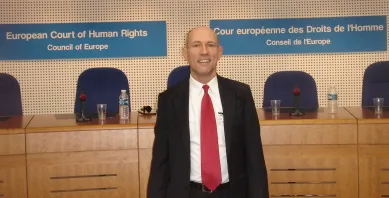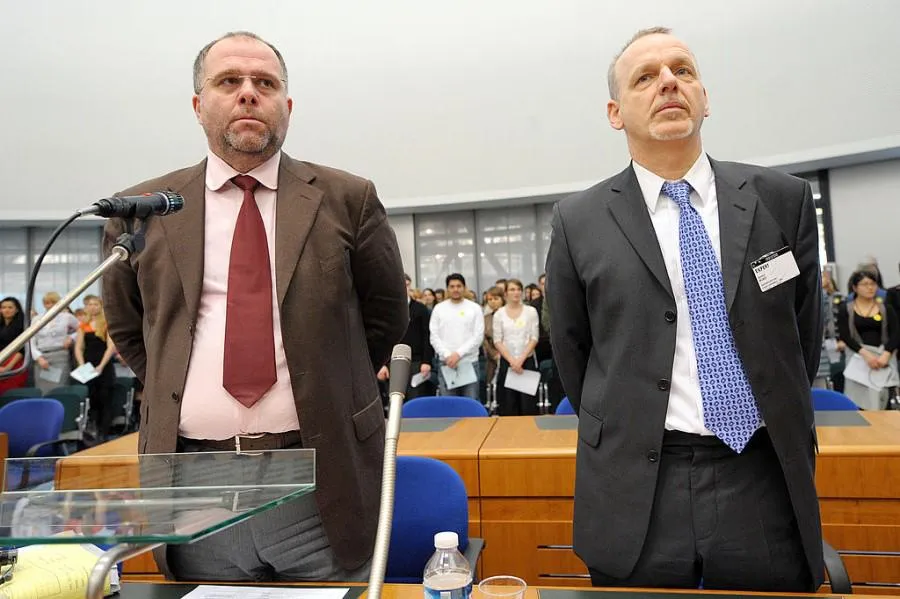On the day the judgment came out, I was at a celebration and I said, ‘I think it's time we started submitting third party interventions in these cases.’ I had read the arguments in the case and some of the language was just not what the community would use. For me, there was this whole perspective that was being ignored.
Professor Robert Wintemute
23 March 2022
Stephen Matthews, Faculty Communications Manager
Over the past twenty years, Professor Robert Wintemute, from The Dickson Poon School of Law, has published influential research on a range of issues related to LGB equality. But his self-confessed “impatience” has led him to go beyond the traditional role of the research academic, advising and representing clients in a string of test cases that have had a positive impact on lives across Europe.
Over the past twenty years, Professor Robert Wintemute, from The Dickson Poon School of Law, has published influential research on a range of issues related to LGB equality. But his self-confessed “impatience” has led him to go beyond the traditional role of the research academic, advising and representing clients in a string of test cases that have had a positive impact on lives across Europe.

Advancing the rights of minority groups is generally a slow process. For Professor Robert Wintemute, it is one of “incremental change, in small steps.”
Though Wintemute had previous experience of strategic litigation, in the US, his decision to lend his professional support to LGB rights cases – as an independent expert, advisor and lawyer - can be dated to September 1999. The UK government had just been told that its ban on lesbian and gay servicepeople in the armed forces had to go.
In 2000, drawing on his research on sexual orientation discrimination, Professor Wintemute submitted his first third-party intervention to the European Court of Human Rights.
Although unsuccessful, he describes it as a “good experience”: “I was disappointed for about 30 seconds and then I focused on the dissent. It was four to three - three Western European judges had voted for us, and three Eastern European judges had voted against. The casting vote went to the French judge, who supported the French government.”
This geographical split showed Wintemute the importance of the “European consensus”.
Basically, the European Court of Human Rights likes to have the majority of countries behind it. If you can say, ‘The majority of countries in Europe don't do this anymore,’ you make it much easier for the Court.
Professor Robert Wintemute
Though the precise size of the required majority remains unclear, this need to "pick your moment" remains central to Wintemute’s approach.
The following year he made, in the words of one writer, a “possibly decisive” contribution in a case involving tenancy rights.
An Austrian man, Siegmund Karner, had lost his partner to AIDS in the mid-1990s. With only his dead lover’s name on the lease, their landlord sought to evict Karner, pursuing him as far as the Austrian Supreme Court. Karner lost and was evicted.
Karner had himself died before the case was heard, but Wintemute argued that, given the ramifications, the Court should still issue a judgment.
The Court ruled that Karner had suffered discrimination, an important precedent, but failed to deliver more significant progress. Article 8 of the European Convention on Human Rights establishes that “Everyone has the right to respect for his private and family life, his home and his correspondence.” If discrimination can be shown to affect any of these four areas, the Court can find a violation has occurred. By focusing solely on the tenancy – Karner's ‘home’ - the judges, in Wintemute’s words, “dodged the issue” of whether a same-sex couple could be a family.
Again, the waiting game. In 2010, the Court heard its first same-sex marriage case, Schalk & Kopf v Austria. Though Wintemute thought the case was doomed, he saw an opportunity to seek clarity on family life: "I said in my third-party intervention that judges across Europe really needed guidance on this question. And when I read the judgment - June 2010, paragraph 94 - there it was. ‘Same sex couples have family life’. I call it a ‘We Are Family’ moment!"

Horst Michael Schalk (right) and his counsellor Klemens Mayer wait for a Chamber hearing, European Court of Human Rights, Strasbourg, 2010. Photo credit: Frederick Florin/Getty Images.
By 2015, the Court had returned to the question of same-sex marriage.
In his research on marriage and civil partnerships, Wintemute had argued that governments should provide the same options to all citizens, regardless of their sexual orientation. His collection, Legal Recognition of Same-Sex Partnerships, brought together an international team of scholars to examine the experience of same-sex marriage in the Netherlands and other legal developments around the world. Furthermore, his research on the equal treatment of unmarried same-sex couples showed there was an emerging “European consensus” on the need for civil partnerships as an alternative to marriage.
Having accepted Professor Wintemute’s third-party intervention, the Court concluded, in Oliari & Others v. Italy, that Italy had an obligation to introduce a “specific legal framework” for same-sex couples.
Three of the judges took the unusual step of saying their reasoning only applied to Italy. While Italy legalised civil unions for same-sex couples in 2016, the judges’ approach made it unclear whether the judgment applied beyond Italy.

Rome Pride, 2016, held just after Italy passed its law on civil unions. Photo credit: NurPhoto via Getty Images.
While he waited for further progress on same-sex marriage, Wintemute addressed discrimination in a range of other areas.
In Taddeucci & McCall v. Italy (2016), he represented an Italian-New Zealander couple, securing equal residency rights for same-sex partners from outside the EU.
In Walker v Innospec (2017), he argued, on the basis of his comparative research on employment law, that a pension provider’s refusal to pay the full benefit of a pension to a same-sex partner would effectively mean the deceased had been paid a lower wage. The UK Supreme Court’s ruling closed a loophole in the Equality Act, with Lord Kerr, one of the Supreme Court judges, quoting Wintemute’s work.

In Beizaras & Levickas v Lithuania (2020), Wintemute was asked to represent a same-sex couple who had received threats of violence after posting a photo of them kissing on Facebook. Despite a complaint, the Lithuanian Prosecutor General had refused to act.
Wintemute argued that States had a clear duty to protect same-sex couples, in the same way as they would other groups. The Court’s conclusion, that the Lithuanian authorities’ failure to act represented discrimination on the basis of sexual orientation, has far-reaching implications, requiring all 47 Council of Europe countries to investigate and prosecute anti-LGB hate speech.
Over twenty years into his work supporting litigation on LGB rights, Wintemute is as active as ever. On 23 March, he will represent the mother of the late author of the children’s book Amber Heart. The Lithuanian government had halted distribution of the book, which depicts love between people of the same sex, warning of its negative effects.
But perhaps the most important case is yet to come. On 27 April, the Court’s 17-judge Grand Chamber will hear Fedotova & Others v. Russia, a case that could require the Russian Federation, a country of 145 million people, to pass a civil partnership, or similar, law for same-sex couples. Professor Wintemute has submitted a third-party intervention. With further cases pending in Ukraine, Poland, and Romania, and thirteen other Council of Europe countries still to make such a move, this case could prove a further significant milestone in the long campaign for LGB equality.
In 2017, Professor Robert Wintemute discussed how the 1957 Wolfenden Report led to the 1967 Sexual Offences Act, and the domino effect that ensued.

